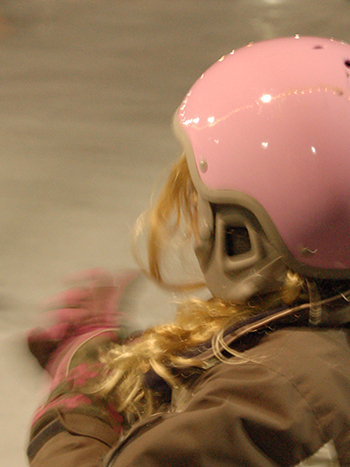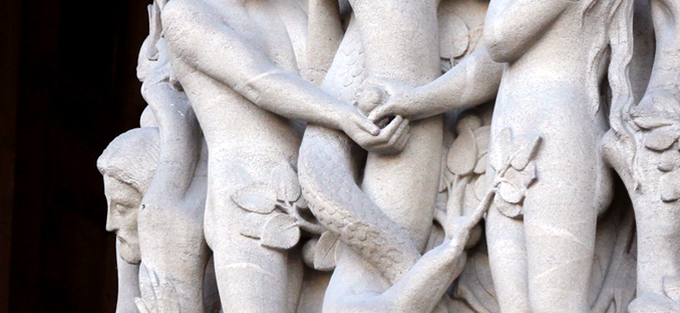by Amanda Zentz-Alo
Created in God’s image, human beings are strong, creative and powerful. Our bodies are intricate and magnificent creations, filled with mystery and wonder.
So when the woman saw that the tree was good for food, and that it was a delight to the eyes, and that the tree was to be desired to make one wise, she took of its fruit and ate; and she also gave some to her husband, who was with her, and he ate. Then the eyes of both were opened, and they knew that they were naked; and they sewed fig leaves together and made loincloths for themselves. They heard the sound of the LORD God walking in the garden at the time of the evening breeze, and the man and his wife hid themselves from the presence of the LORD God among the trees of the garden.
But the LORD God called to the man, and said to him, “Where are you?” He said, “I heard the sound of you in the garden, and I was afraid, because I was naked; and I hid myself.”
He said, “Who told you that you were naked? Have you eaten from the tree of which I commanded you not to eat?” The man said, “The woman whom you gave to be with me, she gave me fruit from the tree, and I ate.” Then the LORD God said to the woman, “What is this that you have done?” (Genesis 3:6-13)
Eyes. Ears. Skin. We have muscles that propel us through space. And our brains? Marvelous! Our created bodies are masterpieces in God’s creation, proclaimed “very good” (Genesis 1:31).
Yet, somehow, we have a difficult relationship with these gifts of flesh and blood, our bodies. We have exploited them, shamed them and manipulated them, and our interactions with them have sometimes even become deadly.
Every day, we are exposed to hundreds of messages about our bodies and what to think of them. Whether it is advertising for ways to clothe them, shrink them, make them more muscular, tan them, bleach them, surgically alter them . . . every day, our culture tells us our bodies are not good enough.
This takes a toll. According to the National Eating Disorder Association, 20 million women and 10 million men in the United States experience an eating disorder in their lifetime. And it’s not just adults. Even children as young as six express concern about their body image. Instead of hearing God say, “This is good,” our children hear, “Don’t get fat!”
This struggle to love our God-given bodies is not unique to our time and culture. In fact, body shame can be seen in the very first chapters of Genesis.
When the first humans choose to eat the apple in the garden, we read, they seek to be wise, to understand the world. It is not their intention to break their relationship with their loving Creator and leave the garden. Their hope is to learn the difference between good and evil.
But the very first things that Adam and Eve see as evil are their own bodies. They discover that they are naked–and they are ashamed. Body shame has come into the garden.
God knows our pain of body shame
 A parent of a fierce young daughter wrote to me, “When she was eight, she freaked out because her weight crossed fifty pounds. I was floored. . . . What could I do?”
A parent of a fierce young daughter wrote to me, “When she was eight, she freaked out because her weight crossed fifty pounds. I was floored. . . . What could I do?”
A powerful moment in my own faith was when I thought about the pain that God must feel when we spurn something that God created and gave to us as gift. Like a parent who watches their child start to despise themselves, every day God watches us human beings struggle with body shame. Now, when I read the words of Genesis 3:13, I do not hear divine anger; I hear divine grief. God’s children had chosen a harder path.
My friend continued, “I could let her play roller derby. Now she says, ‘Mom! Look at the big muscles in my legs!’ And she looks at the derby players as strong . . . certainly never fat.”
Communities against body shaming
There are communities that speak up against body shaming. Communities like the one around roller derby certainly support empowered bodies. These groups speak the truth that God intends for us.
We have been created, named and claimed by a God who sees us as inherently good. Somewhere along the line we forgot that. We left the garden and we stepped out into the world afraid of our bodies. Yet God still sees us as good. As strong. As powerful. As magnificent. And the Spirit uses communities like roller derby to tell us, “Don’t listen to that snake. Don’t believe what you have been told. Your body is wonderful. Your body is good. See God in what you do because it is marvelous.”
When we claim this truth, that our bodies are good gifts from a loving Creator, we take a step back to the garden, a step forward to God’s kingdom.
You are created good. Your body is a gift. Every part of it. May you come to know this, believe it, and share that belief with those around you.
Reflection questions:
1. Where do you see God’s image in your own body and its abilities?
2. Describe a time when you have truly felt good about your body. How does it feel to describe that time? How do you want it to feel?
3. What are five compliments you can give your friends or young children you interact with that encourage body positivity?
Closing prayer:
Creating God, open our eyes to the goodness of your creation. Give us the courage to claim our own bodies as gifts from you. Open our hearts to love ourselves so that we can more deeply love others. Remove shame from your children and fill us with your celebration. In the name of the one who became embodied for our salvation, our Savior Jesus Christ, we pray. Amen.
The Rev. Amanda Zentz-Alo serves Central Lutheran Church in Portland, Ore. She has a passion for baptism and liturgy. When not at church or home, she can be found with her local roller derby league, answering to the name FeeNix.
Photo of Adam and Eve by Archway Andrews. Photo of the little girl in the helmet by Kris.

